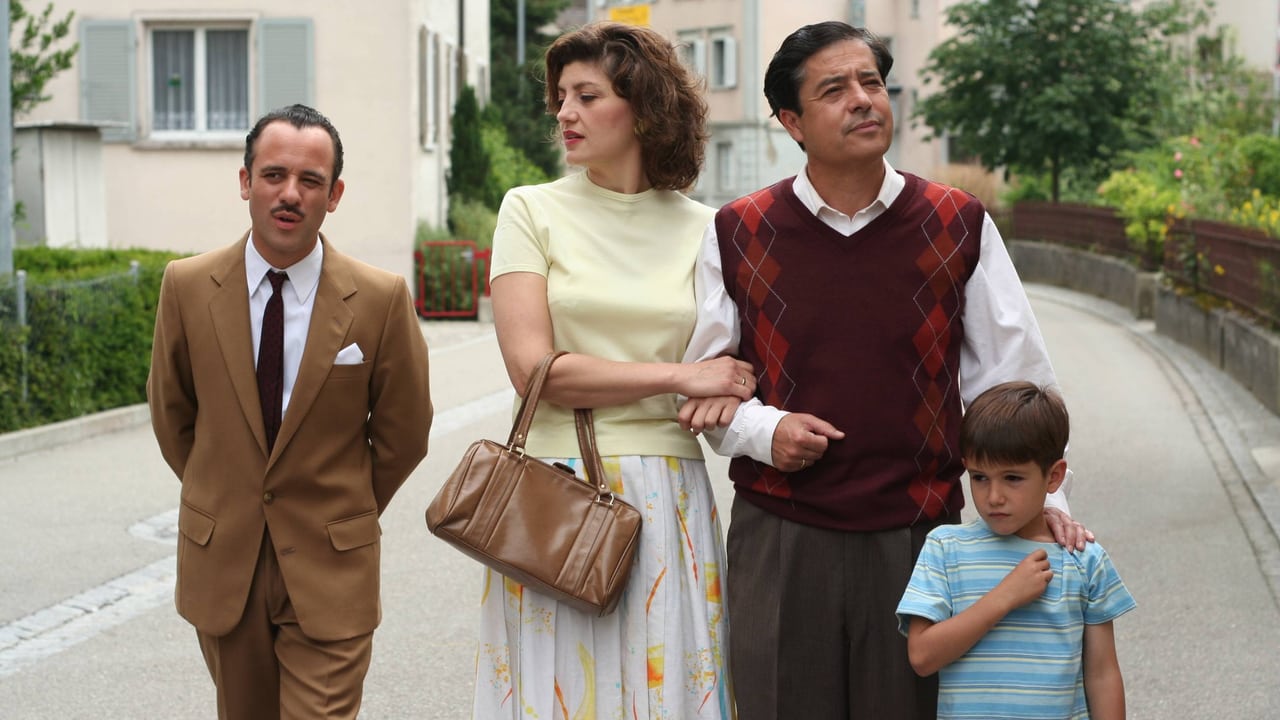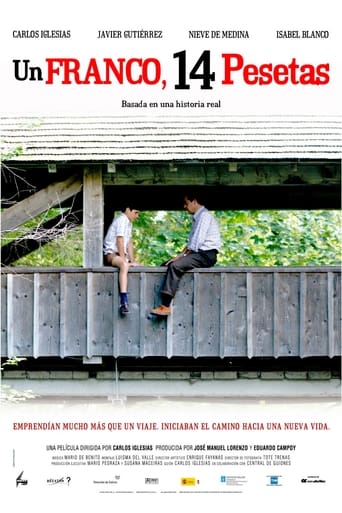

a film so unique, intoxicating and bizarre that it not only demands another viewing, but is also forgivable as a satirical comedy where the jokes eventually take the back seat.
... View MoreThis is a dark and sometimes deeply uncomfortable drama
... View MoreThe movie is wonderful and true, an act of love in all its contradictions and complexity
... View MoreThis is a dark and sometimes deeply uncomfortable drama
... View MoreCrossing Borders... is A Spanish-Switzerland comedy released in 2006 that tells the story of two couples of Spanish immigrants in Switzerland in the 1950s based in the autobiographical experience of the actor and director Carlos Iglesias.This is a very sweet, funny, honest and intimate film about the lives of those Spaniards who migrated to Switzerland and other European countries in the 1950s and 1960s. It is faithful to real events, and shows the issues that affected those people when leaving their country, the pros and cons of being an Spanish emigrant, and of the country of origin and the country of reception. Especially good is the depiction of the feelings of alienation, loneliness, cultural and emotional isolation, distrust by the locals, but also how hard was going back home for those who decided to return and resettle.All the cast is good in their performances, especially Nieves de Medina as Pilar and Isabel Blanco as Hanna.The movie is unpretentious, talks about serious issues using comedy, and has heart. I think it will reach immigrants from any part of the world, but also any viewer wanting to see something different from Spain and about Spain recent history.
... View MoreI saw this touching film last year when I was in Spain. I highly recommend it - moving story , luscious scenery, realistic situations, sensitive characters, all in all....an unforgettable film! Portrays the life of immigrants and how torn one can be between one's new country and one's past life..... The main actor understood this very well because he directed the film which I believe was based on his own experiences as a child. It won several Goya awards in Spain. Many people who have left their country for a better life will be able to identify with this film. My heart was aching somewhat when I left the theater and I even wished the characters all the best!
... View MoreSpain in the 1950s and 1960s was still a poor country. Like Italians, Portuguese, in other less industrialized European nations, Spaniards that couldn't make a decent living in their own country emigrated to Germany, Switzerland, and France, where there were more possibilities for them. The idea was for the head of a family to go, start working, save as much as he could to send it back home.Martin and Pilar, a young couple, have to live with his parents in the basement apartment in the building where the older man is the super. Pilar, who had her eye in a new building in the outskirts of the city has given a deposit for the apartment she thinks is her salvation from living with the in-laws. Imagine Martin's surprise when he learns she has spent their savings for the down payment for an apartment and he has just been laid off.Marcos, one of Martin's friend, also unemployed, tells him about his intention of emigrating to Switzerland. He has heard mechanics are needed for the Swiss factories. Without no working permission the two embark in the adventure of their lives. They must leave family behind and enter Switzerland without work permits; both men are lucky not to be sent back home. The small town they decide to try their luck has a small factory where they eventually land jobs.Martin and Marcos are not prepared for the shock they receive in a country that proves to be as different from theirs like day and night. They land jobs, eventually. They have settled in a small pension in town where Hannah, the woman who runs the place doesn't understand her guests. The result result in funny situations where the Spaniards' more affable character prove to be a winning card for them. Loneliness proves to be hard for the men as their spouses are so far. Martin has an involvement with the kind Hannah.Pilar, who has decided on her own to go to Switzerland to join her husband, has spent a year's worth of remittances from Martin in the apartment that she supposedly has bought, but in reality she was duped from an unscrupulous building agent. When Pilar arrives, she senses how her husband has been having an affair, but nothing much comes out of it when they find an apartment of their own. Their life takes a nice rhythm in their new adopted country. Years go by, and after Martin's father's death, they decide to go back home, a sad mistake for the whole family.Carlos Iglesias, who wrote, directed, and starred in this film, is someone new to us. His nostalgic look at what appears to be a biographic picture, has some great moments that reflect a bygone Spain, a poor country during the years where the action takes place. The film is a hymn to those men that went to make a living, living family and friends behind. It's clear Mr. Iglesias knows what he is talking about and what comes out in the film is a loving tribute to those men who sacrificed it all in order to help their impoverished families.The director, who plays Martin, has some good moments in the film, especially the beginning of his life in the new country. Javier Gutierrez is also quite appealing as Marcos. Nieves DeMedina, is seen as Pilar, in a touching performance. Isabel Blanco, who plays Hannah, was a surprise."Un franco, 14 pesetas" proves the point that for some emigrants that try to go back home find it almost impossible to adapt themselves to a pace and an atmosphere in the old country that seems alien to them now, as it's the case with Martin's son who can't adapt himself to the Spanish ways. These people have invested a lot of their lives in a new culture and adapted with a lot of effort, so going back is not exactly easy for most of them. Leaving comforts for an uncertain life back home is not something most of these families would even consider.
... View MoreIt was my first Spanish movie and I had no idea what to expect, but I'm so glad I chose it in the end, I found it so much more interesting and entertaining than the other movies i'm used to. I am definitely going to see if I can find some more of Carlos Iglesias - I absolutely loved him.A wonderful movie, beautifully filmed, with light yet very effective humour. The actors are simply perfect, the story flows at the right pace, and you enjoy the movie from beginning to end. Offers a great contrast between the lives of the Spanish and the swiss in the 1960's. A Spanish must-see.
... View More